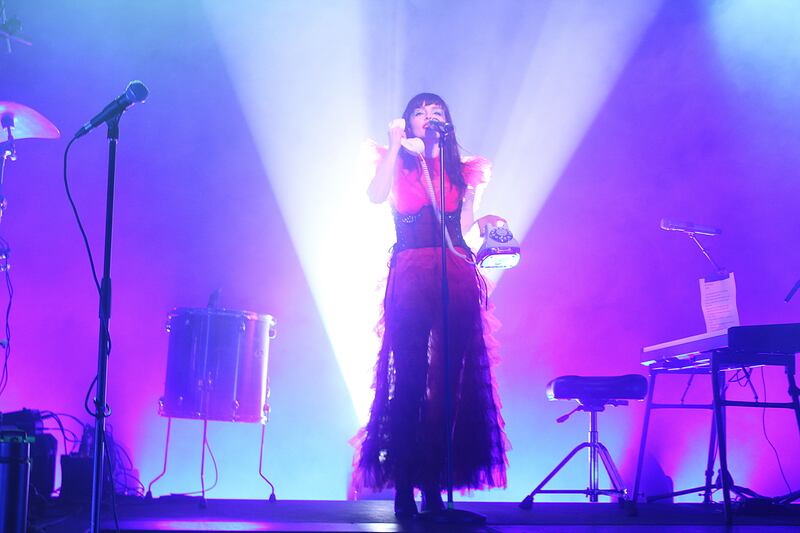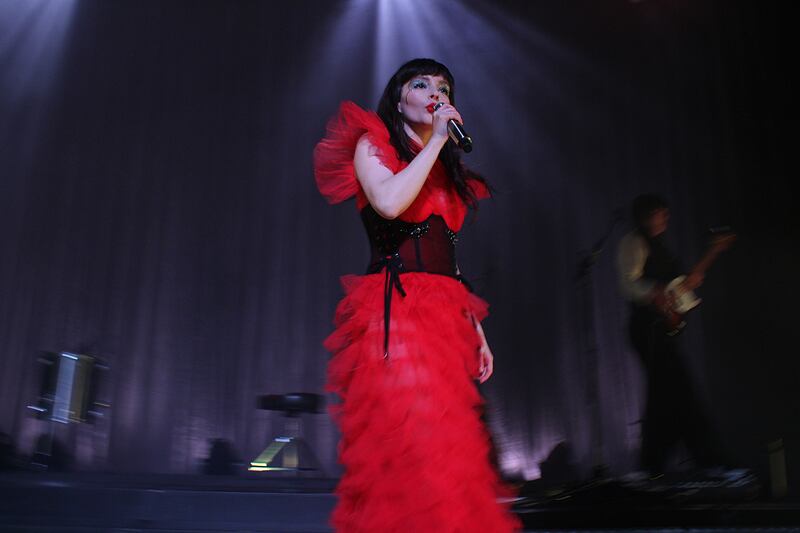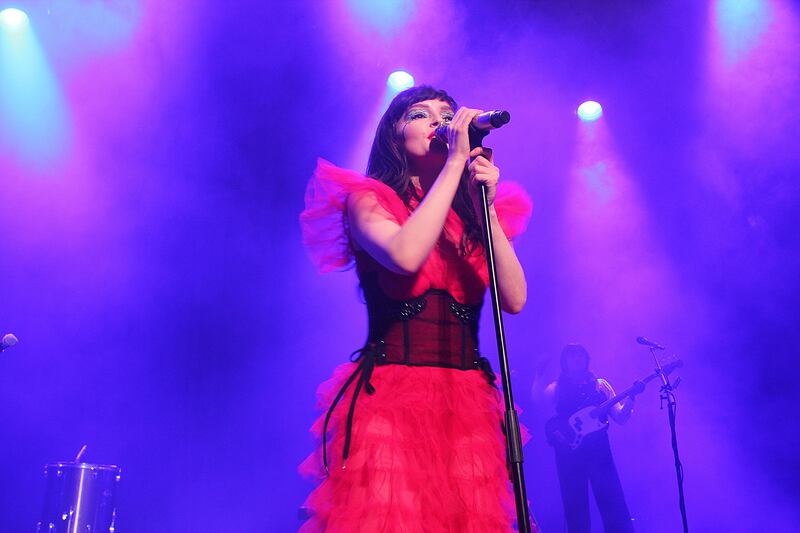A hazy blue enveloped the stage at the Belasco in Los Angeles. The crowd packed the pit awaiting the arrival of Lauren Mayberry, the Scottish musician marked by her high-pitched voice and striking visual style.
Her performance on Sunday, March 3, would be the last stop of Mayberry’s current tour across North America promoting her debut solo album “Vicious Creature.”
Mayberry is the lead singer of CHVRCHES, the electro-pop band known for albums like “Love Is Dead” and “Screen Violence.” It was even featured in Hideo Kojima’s “Death Stranding,” releasing a single of the same name for the game’s soundtrack.
However, “Vicious Creature,” which was released in December 2024, marks Mayberry’s first time venturing out on her own. In turn, she transformed her own musical voice beyond her established artistic brand.
As the lights dimmed, artist Cult of Venus took the stage to open for Mayberry. With spotlights aiming at the synthesizer at the center of the stage, a figure with ghostly blonde hair draped over the face walked on.
Performing songs like “Time Capsule” and the all-too-timely “Mountains,” Cult of Venus served as a natural bridge between Mayberry’s work in electronica and her new endeavor. With a voice like a siren and a rush of distorted notes, Cult of Venus created an overwhelming feeling of moody melancholy that would quickly be juxtaposed with the main attraction.

After Cult of Venus stepped off, the audience waited in anticipation. When the stage lights turned purple, Mayberry danced onto stage in a vibrant, red dress and silver glitter around her eyes, skipping to the tune of her single “Crocodile Tears.”
A theme that seems present in both the performance and the latest album is the notion of “liberation.” On stage, she danced freely—flailing her arms, spinning around, throwing the microphone stand. It served as a distinct opposite to Cult of Venus’ more robotic movements. The performance served as a symbolic musical freeing—first from the confines of her past work.
“Vicious Creature” is a mix of upbeat pop pieces like “Something in the Air,” softer works like “Oh, Mother” and even aggressive hard rock like “Sorry Etc.” Without the use of a synthesizer, Mayberry was accompanied by a drummer and guitarist, working to stray away from her experience in electronica, transcending clear genre labels in search of an evolved creative perspective.
While it was CHVRCHES that previously defined her artistic image, her solo work gave her the chance to overcome the block of artistic stagnation.
Her performance is also an emotional awakening as she unshackles herself from gendered expectations.
It is no secret that Mayberry is a vocal feminist, both on and off the stage. After all, her activism is already woven in the complex lyrics of her CHVRCHES pieces.
“Swallowing the seeds of sins we sewed into the ground
Keeping secrets until everything became a bit too loud
I could wash it down
I could drown it out
By filling up the silence with an organ sound
And by writing sentences I used to think were quite profound.”
- “Final Girl” by CHVRCHES
However, with “Vicious Creature,” she makes it even more apparent.
“I feel schizophrenic, how poetic, romanticize all the pain
How pathetic, drinking gasoline and calling me the flame
Baby, I’m a hypocrite, I’ll take you to the grave
Oh, what a shame.”
- “Shame” by Lauren Mayberry
Influenced by artists like Tori Amos and Fiona Apple, Mayberry retains her rich lyricism while creating a sense of unfiltered relatability. In fact, the album and tour title comes from a line in her song “A Work of Fiction,” referring to how nostalgia is a “vicious creature.”
“Obsession with the past has always been a difficult thing for me,” she stated in a press release. “I hold onto things like a dog, to be honest, and I stay loyal to people long past the point that it’s logical or healthy.”

Throughout her more high-energy songs, Mayberry strutted on stage, using props like a megaphone with a spotlight attached and a telephone in her performance. In her softer, more introspective pieces, she would sit down at a set of keyboards, allowing the audience to catch their breath.
The brash and rebellious tone of “Shame” aimed to capture a raw image of “sexuality, gender and empowerment” contrasted with the quieter “Are You Awake?” evoking a feeling of profound loneliness. Meanwhile “Mantra” sought to shatter the idea of women needing to remain “nice” in the face of mistreatment.
The concert culminated in a performance of “Sunday Best,” a mix of both a “cinematic” pop song while feeling “scuzzy and strange,” as Mayberry described. In it, she returns to her roots as a drummer, hammering away on toms before singing a rapid bar to the rhythm.
Mayberry works in the business of musical empowerment, not only using the art to push her own artistic limits, but to uplift listeners feeling chained down by societal norm or personal burden.
If anything, Mayberry asks the audience to battle their own vicious creatures. Rather than holding onto past pain and glory, she pushes them to fight for a future of living and dancing freely.
